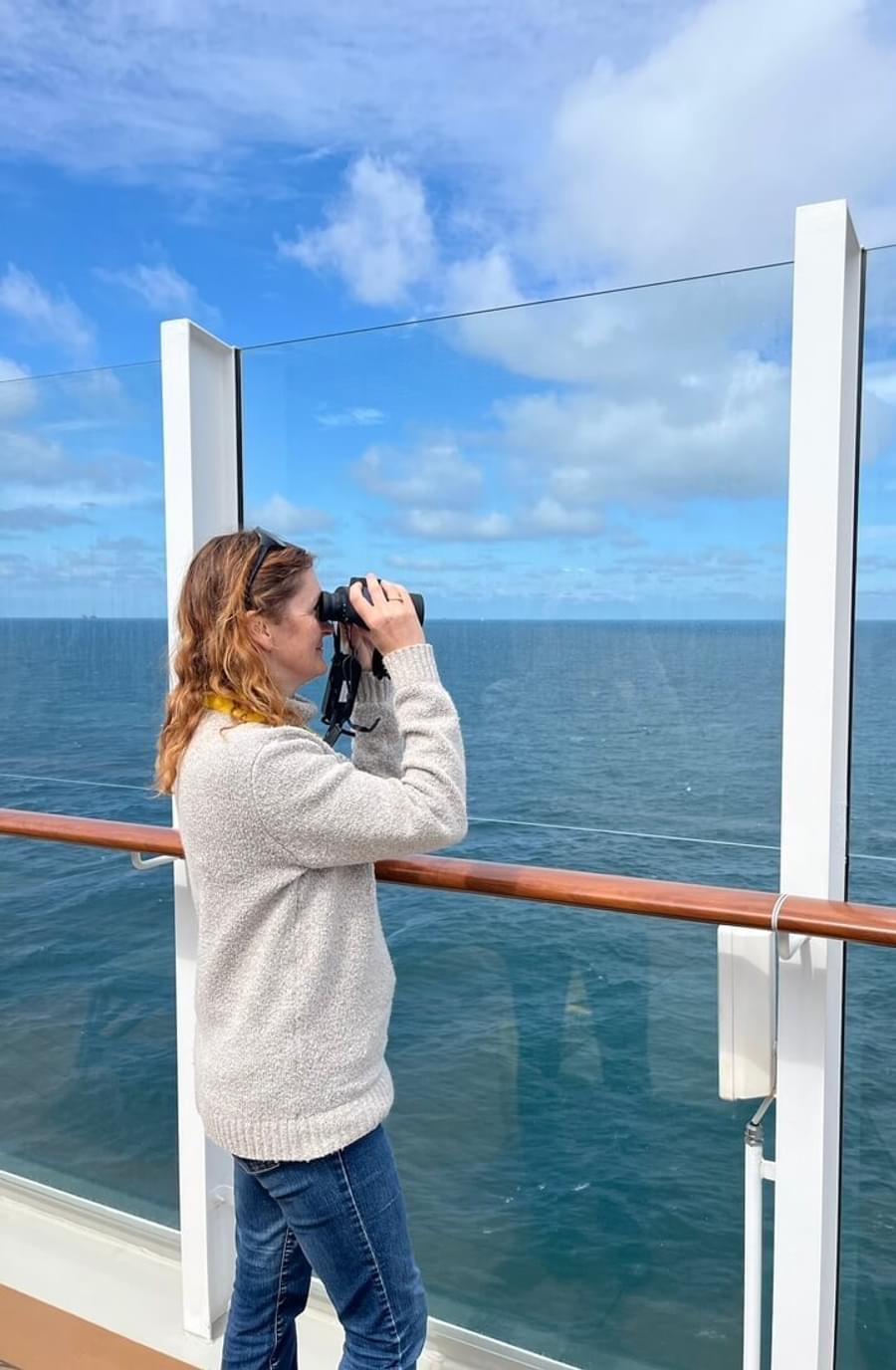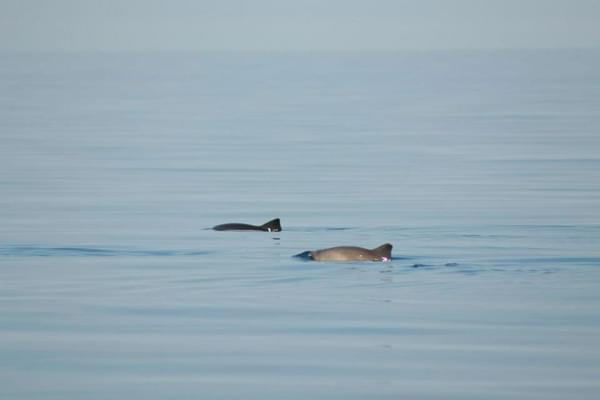We spoke to ORCA supporter Iona Chisholm for her opinion on ORCA’s education programme and about her first experiences of sea surveying.
How did you find out about ORCA?
I was travelling with my family on Brittany Ferries to Santander in August 2023 to go caravanning in Spain. I have always loved watching the sea for dolphins and with two of our four sons studying marine biology, we were all out on the open decks, observing for whale and dolphin activity. We were absolutely delighted to find ORCA information panels on deck and soon after, we found the ORCA representative on board and attended their presentations. I then discovered that there was an amazing opportunity for me to further my own learning and even record valuable data by doing ORCA’s training programme.
Which ORCA courses have you done?
I completed the ‘Introduction to Whale & Dolphin Identification’ in June 2024 and ‘OceanWatchers’ in July 2024. Both of these courses were completed in my own time on ORCA’s e-learning platform.
Why did you do these courses?
I believe that every day is a learning day and I felt that ORCA’s online courses offered an accessible and straightforward way for me to find more fulfilment from my interest in cetaceans - and at a very reasonable cost. As an ex-lawyer, I did not have any marine biology qualifications and I really believe in the importance of caring about marine life and wanted to do something about it. Following our ferry crossing to Santander and as I was about to go on my first cruise holiday, I felt that this was the right time to make my travels more worthwhile by doing sea surveys and actively participating in whale and dolphin conservation.

What did you think of the ‘Introduction to Whale & Dolphin Identification’ Course?
This online course gave a useful insight into ORCA and their work along with a very comprehensive introduction to north-east Atlantic cetaceans. Once I’d started this course, I was completely hooked and spent every spare minute that I had on it!
It is split into manageable sections dealing with different topics and you work through the material at your own pace, doing tests throughout and a final quiz at the end before receiving your certificate. You have three months to complete the course, which I would say is plenty of time. I found it so interesting that I had completed it within a week!
I particularly enjoyed the video clips of the different cetacean species and the fact that I can return to the course as much as I like over a period of 3 months to reinforce my knowledge.
When I completed this course and received my certificate, I felt like I had achieved something special and was more confident in my knowledge of the individual characteristics and distribution of different whale, porpoise and dolphin species.
What did you think of the ‘OceanWatchers’ course?
This course explains how to use the ORCA OceanWatchers App to access all of the resources on it and how to carry out an official ORCA survey from land or at sea using your own mobile phone.
The App contains comprehensive information on cetaceans including illustrations of key physical features, typical behaviour and group size. This is a very useful reference guide when you are doing a survey.
Whilst you are doing this course, you use your own mobile phone to work through all the requirements of a sea or land survey, including assessment of sea and weather conditions, recording your land position or vessel type, deck height, field of view and any cetacean sightings/behaviour. Then, when you are doing an official survey, it is just a case of following all these steps on your mobile phone wherever you are, to input the correct information and submitting your survey once it is complete.
I found this course well structured and easy to follow, but thought that the proof of its success would be when I did my first sea surveys!
Tell us about your first sea surveys.
I travelled on P&O ‘Iona’ (it had to be!) to the Norwegian Fjords in July 2024.
My first sea survey was on our first sea day, from Southampton and up into the North Sea. Conditions were great with only occasional white caps, low swell and excellent visibility. I found it easy to complete all of the required steps for the survey, taking regular sea state and weather checks as well as making comments on my observations of sea birds and jellyfish. The inbuilt GPS features already on my phone (just the usual location settings) recorded my position.
Although I had no cetacean sightings, I still felt that it was an exciting and enjoyable process. A very important lesson that you learn in training is that all data is valuable data and I now felt confident that I could complete a survey correctly and make a useful contribution.
My second survey was taken through a fjord and as we exited out to sea. Again, conditions were excellent and I was particularly happy when the Captain gave a message on the tannoy which confirmed my own visibility and sea state assessments! Again, I had no cetacean sightings but I really enjoyed making regular observations of the sea, sea bird activity and weather.
When taking a sea survey, you do so for a minimum of 30 minutes and if you continue for longer, you input weather and sea state data every 30 minutes or any time there is a change in the weather conditions. When the survey is complete, you can check and edit details and the steps to then submit your finished survey are clear and straightforward.
I had to purchase a specialist set of marine binoculars to record my sightings accurately. They cost me £150 and I have to say that they are one of the best purchases that I have ever made!
Of course, I did see cetaceans on this trip, but not when I was doing a survey, which brings me to another important point in the training which is that you should not start a survey as a reaction to a sighting, as this skews the data. It is also because by the time you have input all the initial weather and sea state data necessary to start a survey, your GPS position at sea will have changed and enough time will have passed to mean that making a record of your first sighting will not be accurate.
Taking my first sea surveys gave me real confidence that all I had learned in the course was well embedded and that the App was well designed to support me in making accurate judgments. When I completed and submitted my surveys, I felt a real sense of achievement at becoming part of ORCA’s citizen science network! Next time I hope to be able to record some cetacean sightings as well!
What are you going to do next?
I am regularly revisiting the ORCA website and resources to make sure that I retain my knowledge. Being able to do this means that I am confident in my ability to record sightings of different species accurately. I hope that one day soon, my data will feature on the online ORCA world map which shows all of the cetacean sightings of the last 30 years!
We visit Dorset regularly and I plan to do land surveys from the ‘Dolphin watch’ area at Durlston Country Park and National Nature Reserve. Also, I will be travelling by boat in the Straits of Gibraltar with my family next summer and am really looking forward to doing more sea surveys when I am in this area.
I hope that by travelling responsibly and making as many assessments of the sea as possible that my efforts will safeguard the future of whales and dolphins.
What would you say to anyone who is wondering whether to do these ORCA courses?
I’d say if you love whales, porpoises and dolphins then just GO FOR IT!
When I’d done my first sea survey, I felt such a strong sense of pride, and that I was making a really valuable contribution to the understanding and future protection of marine life on our planet.
Once you’ve joined ORCA and done these courses, I can guarantee that you’ll never look at the sea in the same way again and I do believe that if enough people act then we can work together to make a huge difference for the protection of our seas and marine species - and what could be more worthwhile than that?

Citizen science is at the heart of everything we do and this year we have made it even easier to get involved in whale and dolphin conservation with our brand new e-learning courses. These new courses are the perfect introduction to the world beneath the waves and will teach you everything you need to know about spotting, identifying and record vital scientific data on these incredible animals so that you too can help ORCA's conservation work. Course are live today so visit learn.orca.org.uk to find out more and start your journey to helping us protect whales and dolphins around the world.

